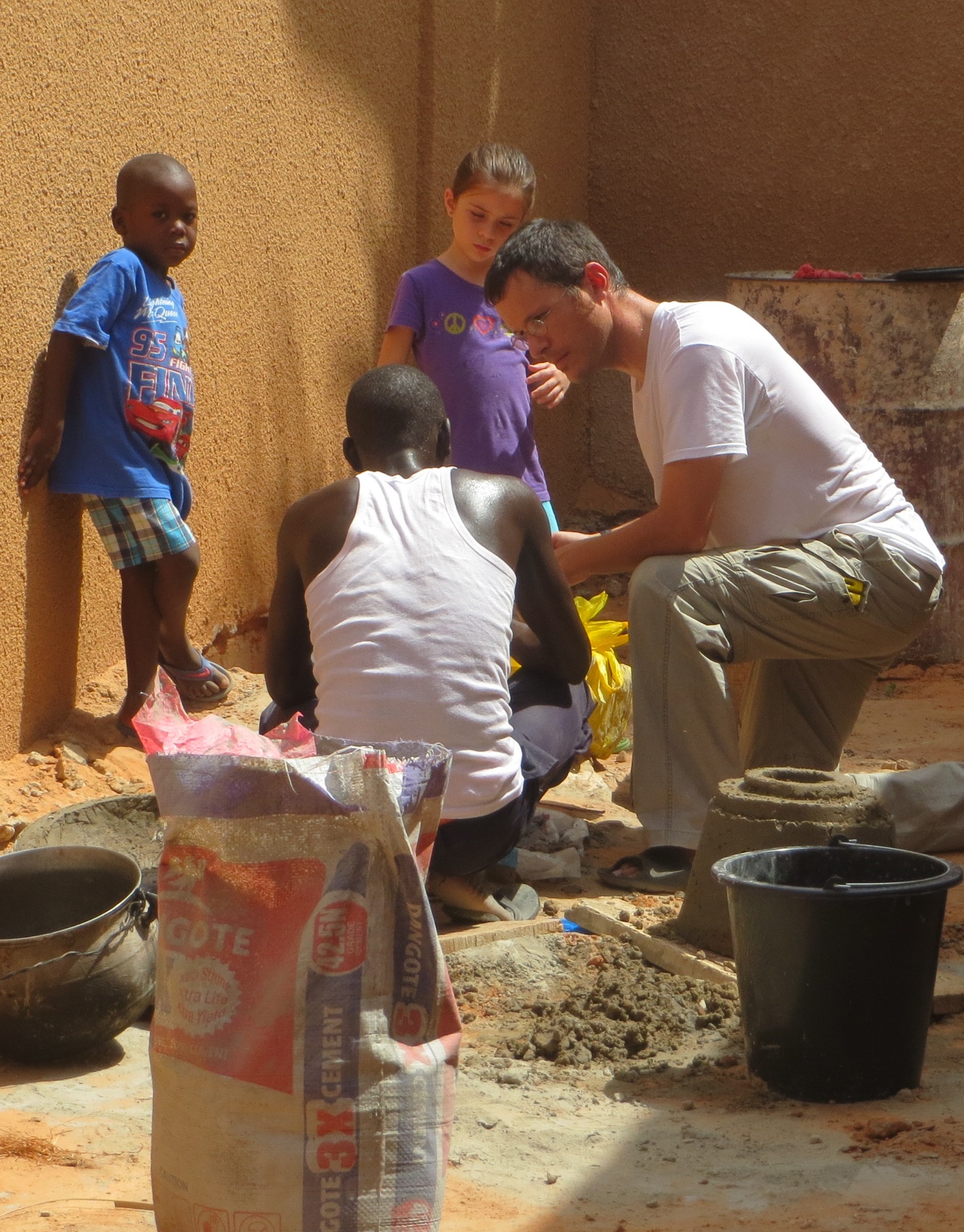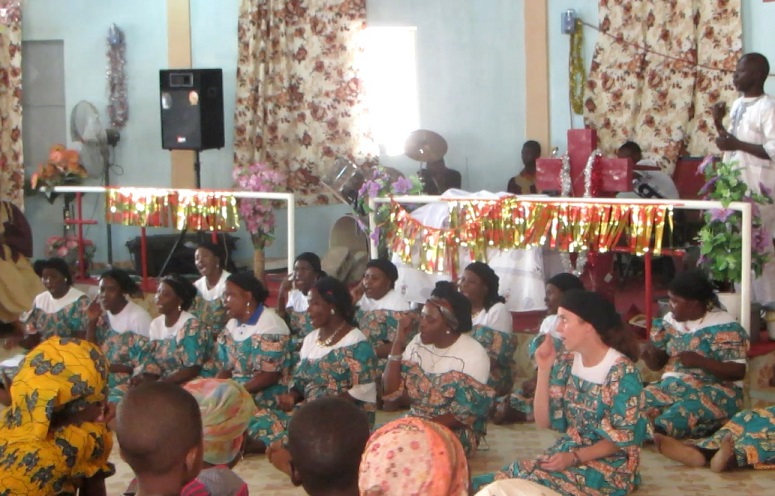A letter from Michael and Rachel Ludwig serving in Niger
October 2016
Write to Michael Ludwig
Write to Rachel Ludwig
Individuals: Give online to E200513 for Michael and Rachel Ludwig’s sending and support
Congregations: Give to D507575 for Michael and Rachel Ludwig’s sending and support
Churches are asked to send donations through your congregation’s normal receiving site (this is usually your presbytery).
Everything is about relationships, so even a simple task of getting a handout printed for my Bible school class means budgeting a decent chunk of time. One day I (Michael) walked into the low, one-room shop along the main road that is stuffed full with pens, tape, backpacks and other office supplies, and was quickly recognized by the owner sitting on the other side of the copiers. After greeting him and quoting a proverb with his friends, they made a big deal with their several other customers that I spoke Hausa and they could talk with me in their own heart language. This is a microcosm of the reactions we have been getting the last few months as our patience in language learning feels like it’s finally paying off. While we continue to meet with our language teacher to do things like read Bible stories and retell them, we’re also consciously focused on visiting various people in our area and having spontaneous practice conversations. Looking back to two years ago, it’s amazing how our ears are starting to pick up what used to be totally incomprehensible, and hopefully our tongues will soon make that big of a leap, too!
We love the local proverbs of the Hausa people we work with here in Niger because they give insight into how the people think and what is common sense for them. One such proverb states, “Mai hakuri yakan dafa dutsi har ya sha romonshi” or “The owner of patience is able to cook a rock until he drinks his broth.” Oftentimes there is an appropriate response when a proverb is invoked, and the counterpoint you can use in reply is “In mai izon wuta ya daure” or “As long as the one tending the fire keeps supplying wood.” There is rich meaning in this point and counterpoint, but it makes me think of our situation as learners and helpers and partners in Niger. In some ways the longer we wait patiently and focus on being here as learners building relationships, the more likely it is that we’ll be able to see our training goals accomplished in the long run (i.e., drink our broth). But we’re not able to do it on our own—we need someone to keep stoking our fires and providing energy and inspiration. So we’re extremely thankful to have you all encouraging us, and to have the Owner of holy fire to sustain us in this task of being bridges in the Body of Christ and ambassadors for the gospel.
After over a year of patient planning with our church partners, the six-year Community Health Evangelism (CHE) training plan is now ready to go forward. The Evangelical Church in the Republic of Niger (EERN) has made this the focus of our work because CHE is a method that gives its evangelists practical teachings to help with the physical problems their communities identify, integrated with the life-giving Good News of Jesus. The training plan allows for a national trainer and an assistant who will become the experts on CHE and walk the church’s evangelists through implementing it in their villages. The national trainer will translate thousands of lessons into Hausa, then set up regional trainings and mentor up to eight CHE evangelists in each region. Eventually the hope is to move on to teaching women’s groups and youth groups within the church to use this method for discipleship and outreach from established churches as well.Another key element of the plan is to acquire additional rickshaw taxis to generate the yearly income for the church to pay for the training and trainers over the long term. Patience is paying off with rickshaw taxis as well. It seemed to take a really long time for this idea to come to fruition, but this effort to set up a motorized rickshaw business got up and running in April. Besides being able to tell a few stories of rickshaw drivers, the months waiting on the first report of the business’ operations also felt painfully long. But we are excited to share that, under the supervision of the president of the church, this business was able to come out a little bit ahead of the profits that were projected for the first six months. Good stewardship with the funds and accurate planning that was followed through made this possible. Also, the churches in our area have really appreciated this effort of building their capacity for sponsoring evangelism and providing jobs for young people.
Our whole family is trying to consciously take a posture of learners that are focused on relationships, and so one of the best ways we’ve been able to do this with our brothers and sisters in the EERN has been through the various fellowship groups. Rachel spent a weekend in the Spring “camping out” with the Women’s Fellowship National Gathering, learning about how selfishness and naïve parenting in an age of new technology is disastrous to family relationships. Michael has been growing closer to our church’s Men’s Fellowship Group at their weekly Bible study and prayer time. And our children have made huge strides in their comfort level with the church through attending the children’s choir practice and singing and dancing with the children during worship!
When we visited a church for the first time a few weeks ago the regional president was there and followed up our greetings by adding that we are people who are “really with them,” as witnessed by our help on these efforts and by the rickshaw drivers present in that congregation.
We’re so thankful that God is “really with us” in the daily struggles of patience and understanding, of being a learner and being a witness. And likewise we’re continually thankful for your prayers, communications, and financial support that help us to know you are also “really with us” in these tasks of being bridges and ambassadors. We’re on track to reach our financial goals for support again this year, but even as we thank you for this we want to put before you some words from Rev. Hunter Farrell in one of his last acts as Director of Presbyterian World Mission: “I want to let you know that this is a critical time for churches and individuals to commit themselves to support mission co-workers. … The sources of funding have greatly diminished, and it is only through the over-and-above gifts of individuals and congregations that we are able to keep mission co-workers doing the life-giving work God called them to do.” To address the great needs around the world that Presbyterians are working on, we appeal to all our supporters to consider an additional gift to other mission co-workers in our country or other places. For example, the ministry we’re a part of is directly connected to Josh Heikkila (E200353), who coordinates our partnership with the EERN and Claire Zuhosky (E200517), who works with the EERN and training youth. Please be encouraged to reach out to help with these needs as you journey with us in the patient undertaking of God’s cross-cultural mission to the world.
Michael and Rachel Ludwig
![]() You may freely reuse and distribute this article in its entirety for non-commercial purposes in any medium. Please include author attribution, photography credits, and a link to the original article. This work is licensed under a Creative Commons Attribution-NonCommercial-NoDeratives 4.0 International License.
You may freely reuse and distribute this article in its entirety for non-commercial purposes in any medium. Please include author attribution, photography credits, and a link to the original article. This work is licensed under a Creative Commons Attribution-NonCommercial-NoDeratives 4.0 International License.

